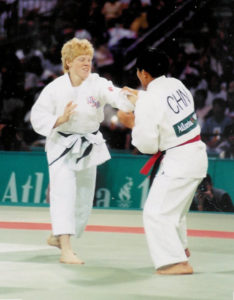I competed in the 1996 Olympics in Judo before I got sucked into the mental health system. I got sucked in due to a spiritual emergency, a marital mismatch, a career that didn’t fit me, and using too much pot. But also part of the reason I got trapped into looking for labels and medications was that I still felt like a disappointment. I didn’t find a way to make myself good enough. Eventually I found the truth about labels and medications (summarized very nicely here on Brain Blogger) and found my way back out.

A friend asked one time, “Is mental health recovery harder than making the Olympic team?”
I said, “Well, looking at the numbers, only about 700 Americans make the Olympic Team every four years. I sure hope more people than that recover from their labels. But then again, NOT making the Olympic team didn’t almost cost me my life 6 times.”
Many of the principles are the same, though. You have to stop listening to people who tell you it’s not possible. You DO have to listen to people who give you useful information. It helps to be pragmatic and do what works and not get caught up in a lot of principles and ideology. You have to realize that your final destination is almost entirely a matter of choice, and take all the responsibility for making a big and bold choice and settling for mediocrity.
The amount of poverty for most Olympic sports is similar, because it’s tough to train and travel and hold down regular jobs and pay for that travel. Only a small minority of Olympic athletes ever get media coverage or endorsements. Have you ever heard of team handball? Can you name which two sports are in Olympic biathlon? That’s what I mean. No one really knows what Judo is; most people have a false picture in their head just like their assumptions about “schizophrenia.”
Here’s my story:















Absolutely amazing. A real uptick in quality here in the articles over the last few weeks.
Amazing, topical, olympics coming up, and wonderful new link from the brain blog at the start too.
Wonderful.
It is just a wonderful piece. And I didn’t bother to read all the naysayers who left comments at the bottom of the brain blog link, because I knew, “You have to stop listening to people who tell you it’s not possible”.
So stop listening it is, haters are going to hate, and naysayers are going to say nay.
Report comment
Look at CW’s face in the picture of her fighting above. See how fierce she looks. That is still in her. The same drive, discipline, and sacrifice that got her to the Olympics got her out of the mental health system, and out of a mental health agency, into developing distress model alternatives to the brain disease model.
Her programs are designed to become economically self-sustaining, except for start-up grants. Keep an eye on my dear friend. She’s only 38. In 25 years, she’ll be only 63. Where will she lead us in that time? I predict she’ll have the persistence to overcome the resistance and go the distance.
That’s why, at 63. I’m board chair and a full-time volunteer in Wellness Wordworks. She’s a winner. She’s a champion. She’s tough. (So am I, but that’s another story.)
Report comment
Corinna,
Great post!
Thank you for linking the Judo competition.
I was never a world-class athete, but grateful I had the opportunity to coach those who were (disabled/blind sports).
Thanks for the inspiration!
Duane
Report comment